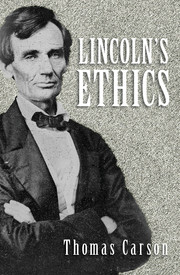Book contents
- Frontmatter
- Dedication
- Epigraph
- Contents
- Detailed Contents
- List of Maps and Figures
- Acknowledgments
- How This Book Came to Be
- 1 Introduction
- PART ONE LINCOLN THE POLITICIAN AND COMMANDER IN CHIEF
- 2 Lincoln's Evolving Policies Regarding Slavery: Compromise and Utilitarianism
- 3 Habeas Corpus, Colonization, and the Status and Rights of Free African Americans
- 4 Did the Union Have Just Cause for Fighting the American Civil War?
- 5 Jus in Bello: Did the Union Fight the War Justly?
- 6 Moral Luck and Lincoln's Good Moral Luck
- PART TWO LINCOLN'S MORAL CHARACTER
- Bibliography
- Index
- Plate Section
6 - Moral Luck and Lincoln's Good Moral Luck
from PART ONE - LINCOLN THE POLITICIAN AND COMMANDER IN CHIEF
Published online by Cambridge University Press: 05 May 2015
- Frontmatter
- Dedication
- Epigraph
- Contents
- Detailed Contents
- List of Maps and Figures
- Acknowledgments
- How This Book Came to Be
- 1 Introduction
- PART ONE LINCOLN THE POLITICIAN AND COMMANDER IN CHIEF
- 2 Lincoln's Evolving Policies Regarding Slavery: Compromise and Utilitarianism
- 3 Habeas Corpus, Colonization, and the Status and Rights of Free African Americans
- 4 Did the Union Have Just Cause for Fighting the American Civil War?
- 5 Jus in Bello: Did the Union Fight the War Justly?
- 6 Moral Luck and Lincoln's Good Moral Luck
- PART TWO LINCOLN'S MORAL CHARACTER
- Bibliography
- Index
- Plate Section
Summary
Here I explain the concept of moral luck and attempt to show that moral luck is a genuine and widespread phenomenon. I argue that, in many respects, Lincoln profited from good moral luck. However, he also suffered bad moral luck.
I. The Concept of Moral Luck and the Widespread Existence of Moral Luck
The rightness and wrongness of our actions depend at least partly on things beyond our control, such as the truth or falsity of the beliefs on which we act and the future consequences of our actions. Sometimes people act rightly or wrongly primarily as a matter of chance and because of things that happen beyond their control. These are cases of what philosophers call good and bad moral luck. Moral luck and things beyond one's control can also affect the goodness or badness of one's character.
Here are some clear examples of cases in which moral luck largely determines the rightness and wrongness of what someone does. Two people are members of a jury in a murder trial. The defendant is innocent, but he is the victim of a diabolically clever frame-up. Many honest and reliable eyewitnesses to the crime who know the defendant well say that he did it, and there is considerable forensic and circumstantial evidence of his guilt. But unbeknownst to the police and members of the court, the defendant has an identical twin separated at birth who committed the crime. Juror 1 is extremely conscientious and weighs the evidence very carefully and comes to the reasonable, though mistaken, conclusion that the defendant is guilty beyond any reasonable doubt. Though the defendant is innocent, this is the only reasonable conclusion to draw, given the evidence. Juror 2 is lazy and inattentive; she does not listen carefully to the evidence presented at the trial.
- Type
- Chapter
- Information
- Lincoln's Ethics , pp. 218 - 228Publisher: Cambridge University PressPrint publication year: 2015



